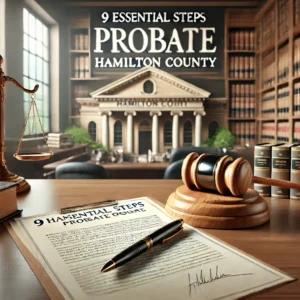Introduction
Brief Overview of Estate Probate in Dublin, Ireland
Estate probate is the legal process that ensures a deceased person’s estate is managed and distributed according to their will or, in its absence, Ireland’s intestacy laws. In Dublin, probate involves validating the will, appointing an executor, and handling the estate’s financial matters. It’s not just about legalities—it’s about protecting the wishes and legacy of the departed. If you’ve ever wondered how assets like property, savings, or personal belongings are passed on, probate is the answer.
Who Is Mary Anderson? Context of the Estate Probate in Dublin
The name Mary Anderson might seem ordinary, but in the context of Dublin’s estate probate processes, it could represent a case of unique interest. Perhaps her estate faced challenges like contested wills or complex assets. Exploring such cases not only helps you understand the probate process better but also highlights how specific circumstances, such as large estates or family disputes, can impact the timeline and procedures.
Importance of Understanding Probate Processes in Ireland
Navigating probate can feel overwhelming. Without understanding the legal framework, you might miss crucial steps. Whether you’re an executor tasked with fulfilling someone’s last wishes or a beneficiary waiting for an inheritance, knowing the probate process in Ireland is vital. Probate isn’t just a legal obligation—it’s a journey of ensuring fairness and fulfilling a legacy.
For official details on the probate process, visit the Irish Courts Service Probate Office.
Understanding Estate Probate
What Is Estate Probate?
Estate probate is the legal process of managing a person’s estate after they pass away. This process ensures their debts are paid, and the remaining assets are distributed according to their will or, if no will exists, based on Irish law. It’s a step-by-step procedure involving the validation of the will (if there is one), appointing an executor, and resolving any legal or financial matters tied to the estate.
For example, if Mary Anderson in Dublin left behind a property or financial assets, probate would oversee how these are handled. This process protects the estate from disputes and ensures legal compliance.
The Legal Framework for Estate Probate in Ireland
Ireland’s probate laws are clear yet detailed. The Succession Act of 1965 is the cornerstone, guiding how estates are managed. Executors or administrators must apply for a Grant of Probate (if there’s a valid will) or a Grant of Administration (if no will exists). These grants empower them to legally access and manage the deceased’s assets.
In Dublin, the Probate Office plays a significant role, ensuring all necessary paperwork is complete before issuing these grants. For example, handling Mary Anderson’s estate in Dublin would involve submitting the will (if any), an Inland Revenue affidavit, and other necessary documents.
Why Probate Matters in Dublin, Ireland: Key Points to Know
Probate is more than just a legal formality—it’s a way to ensure fairness and transparency. Here’s why it matters:
- Protecting Family Interests: Proper probate ensures that the deceased’s wishes are respected and minimizes disputes among family members.
- Legal Compliance: Without probate, beneficiaries might face challenges accessing bank accounts, selling property, or managing other assets.
- Clarity for Beneficiaries: Probate outlines exactly who is entitled to what, leaving no room for confusion or conflict.
For individuals like Mary Anderson in Dublin, probate matters because it simplifies estate management for executors and ensures beneficiaries receive what they’re entitled to. Understanding these processes
Learn more about the Succession Act 1965 and its implications for probate on the Irish Statute Book.
Mary Anderson Dublin Ireland Estate Probate: A Specific Case
Key Facts About Mary Anderson’s Estate in Dublin
Mary Anderson’s estate in Dublin presents a fascinating case study of how probate works in Ireland. Her estate included diverse assets: a family home in Dublin, a modest investment portfolio, and a few sentimental items she wished to pass to specific beneficiaries. While her will clearly outlined her wishes, the probate process revealed complexities such as:
- Disputes Among Beneficiaries: A family member contested her will, claiming undue influence.
- Complex Asset Valuation: Her property required accurate appraisal to ensure fair distribution.
- Taxation Issues: Estate taxes had to be calculated and paid to finalize the process.
These details highlight how even a seemingly straightforward estate can involve unexpected hurdles.
Probate Challenges and How They Were Addressed
Mary Anderson’s probate journey wasn’t without its challenges, but with proper legal guidance, each issue was resolved efficiently:
- Contested Will Resolution: The family dispute was addressed through mediation, avoiding lengthy court battles. A neutral probate solicitor helped the family reach a fair agreement.
- Asset Valuation: Professional appraisers were hired to determine the market value of her property and investments. This ensured accurate calculations for taxes and beneficiary shares.
- Taxation and Compliance: The executor worked with financial experts to navigate Ireland’s estate tax laws, ensuring all liabilities were settled before distribution.
These steps ensured the process stayed transparent, respectful, and aligned with Mary’s wishes.
Lessons Learned From Mary Anderson’s Estate Probate Process
Mary Anderson’s case underscores some critical lessons for anyone navigating probate in Dublin, Ireland:
- Create a Detailed Will: A clear and well-drafted will can reduce the likelihood of disputes among family members.
- Seek Professional Help Early: Probate solicitors and financial advisors can save time, reduce stress, and ensure compliance with Irish laws.
- Prepare for the Unexpected: Even with a solid will, unforeseen issues like disputes or hidden liabilities can arise. Having a trusted executor and a team of experts can help handle these challenges effectively.
- Communicate Wishes Clearly: Discussing your plans with beneficiaries while you’re alive can minimize surprises and disputes later.
Mary Anderson’s probate experience is a reminder that with proper planning and legal support, even complex estates can be handled smoothly.
For mediation services in Ireland related to probate disputes, consider visiting the Mediation Institute of Ireland.
Steps in the Probate Process in Ireland
Gathering Necessary Documents for Probate
The probate process in Ireland begins with collecting the essential paperwork. Without these documents, the process can hit unnecessary delays. Here’s what you need:
- The Deceased’s Will (if one exists): This is the cornerstone document that guides how the estate should be managed.
- Death Certificate: This official record verifies the passing of the individual.
- Assets and Liabilities Statement: Details of bank accounts, properties, debts, and other financial commitments.
- Inland Revenue Affidavit: Required to assess estate taxes.
Make sure these documents are organized and up-to-date. Missing paperwork can stall the entire process.
Applying for a Grant of Probate in Dublin
Once you have the documents, the next step is to apply for a Grant of Probate. This legal authorization allows the executor to manage and distribute the estate.
- Where to Apply: The application is made through the Dublin Probate Office.
- Steps in the Application:
- Submit the original will and other supporting documents.
- Complete an affidavit affirming the executor’s role and the validity of the will.
- Pay any applicable fees for the probate grant.
The process can take several weeks or months, depending on the complexity of the estate. It’s crucial to ensure all forms are accurate and complete to avoid rejection or delays.
Role of the Executor in Managing Estates
The executor is the individual named in the will to handle the deceased’s estate. This role comes with significant responsibilities:
- Valuing the Estate: The executor must determine the value of all assets, from real estate to personal belongings.
- Paying Debts and Taxes: All outstanding liabilities, including estate taxes, must be settled before distributing assets.
- Distributing the Inheritance: The executor ensures that beneficiaries receive their rightful shares according to the will.
- Keeping Records: Detailed records of all financial transactions and communications are essential for transparency.
An executor must act in the best interests of the estate and beneficiaries, ensuring all actions are fair and legal.
Common Issues Executors Face During Probate
Managing an estate is no small task, and executors often encounter challenges along the way:
- Family Disputes: Conflicts among beneficiaries can create delays and emotional strain.
- Unclear or Missing Wills: A poorly drafted or absent will complicates the process, requiring adherence to intestacy laws.
- Complex Assets: Properties with unclear ownership or high-value investments can make valuation and distribution tricky.
- Legal and Tax Complications: Missteps in filing tax returns or interpreting probate laws can lead to legal issues.
These hurdles highlight why seeking professional advice is often essential for executors, especially in Dublin where legal nuances can differ.
Legal Insights on Probate in Ireland
Key Probate Laws in Ireland
The probate process in Ireland is primarily governed by the Succession Act 1965, which lays out the rules for managing and distributing estates. Some key points include:
- Validity of a Will: A will must be in writing, signed by the testator, and witnessed by two individuals.
- Rules of Intestacy: If no valid will exists, the estate is distributed according to the laws of intestacy, prioritizing spouses, children, and other relatives.
- Executor’s Duties: The executor is legally bound to act in the estate’s best interests, settle debts, and distribute assets.
- Taxation Requirements: The estate must comply with Ireland’s tax laws, including the Capital Acquisitions Tax (CAT) on inheritances.
Understanding these laws ensures that the probate process is conducted legally and efficiently.
The Role of the Probate Office in Dublin
The Probate Office in Dublin is the central authority responsible for overseeing the probate process. Its main functions include:
- Granting Probate or Administration: The office validates the will and issues the necessary grants to executors or administrators.
- Ensuring Legal Compliance: It ensures all required documents are filed correctly and that executors fulfill their legal obligations.
- Providing Guidance: While the office does not offer legal advice, it provides resources and information to help executors navigate the process.
If you’re managing an estate in Dublin, the Probate Office is your first point of contact for initiating and completing the probate process.
Differences Between Probate and Administration
While both probate and administration deal with estate management, there are significant differences:
- Probate:
- Applies when the deceased left a valid will.
- The executor named in the will is responsible for managing the estate.
- A Grant of Probate is issued to authorize the executor.
- Administration:
- Applies when there is no valid will (intestacy).
- An administrator (often a close family member) is appointed to manage the estate.
- A Grant of Administration is issued to authorize this person.
Knowing the difference is crucial for handling estates correctly and avoiding unnecessary delays or complications.
Timeframes for Completing the Probate Process
The duration of the probate process in Ireland varies depending on the complexity of the estate. Typical timeframes include:
- Simple Estates: 3 to 6 months if the will is uncontested and the estate is straightforward.
- Complex Estates: 6 months to a year for estates with disputes, high-value assets, or international elements.
- Intestate Estates: May take longer, especially if family disputes or legal complications arise.
Timely submission of documents and proactive communication with the Probate Office can help expedite the process.
Explore more about Ireland’s probate laws and official resources on the Irish Citizens Information website.
Challenges in Estate Probate
Dealing With Will Disputes During Probate
One of the most common challenges in probate is resolving disputes over the validity or interpretation of a will. These disputes often arise when:
- A Beneficiary Feels Excluded: Family members may feel unfairly left out or inadequately provided for in the will.
- Claims of Undue Influence: Allegations that someone coerced the deceased into making changes to their will.
- Ambiguities in the Will: Poorly worded or unclear instructions can lead to confusion and disagreements.
Resolving disputes typically involves legal mediation or, in extreme cases, litigation. To avoid prolonged conflicts, it’s advisable to engage a solicitor specializing in probate law to mediate and clarify legal interpretations.
Managing Complex Assets in the Probate Process
Handling complex assets such as real estate, businesses, or international holdings can complicate probate. Challenges include:
- Valuation Issues: Determining the accurate market value of assets like property or antiques can delay the process.
- Shared Ownership: Properties or assets co-owned with others can require additional legal agreements or negotiations.
- Overseas Assets: If the deceased owned property or accounts abroad, international laws and tax regulations come into play.
Expert appraisers and legal advisors can assist in valuing and managing these assets, ensuring compliance with Irish and international laws.
Addressing Debts and Taxes Associated With Estates
Before any assets are distributed to beneficiaries, all outstanding debts and taxes must be cleared. Common challenges include:
- Identifying Hidden Debts: Executors may discover unpaid loans or obligations, which need resolution before probate can proceed.
- Estate Taxes: In Ireland, beneficiaries are subject to Capital Acquisitions Tax (CAT), depending on their relationship to the deceased and the inheritance value. Executors must calculate and pay these taxes on time to avoid penalties.
- Insufficient Liquid Assets: If the estate lacks enough cash to cover debts and taxes, assets may need to be sold, which can prolong the process.
A well-prepared financial overview of the deceased’s assets and liabilities can streamline this stage and help executors manage payments efficiently.
For guidance on handling inheritance taxes, visit the Revenue Commissioners of Ireland. This site provides details on tax obligations related to probate.
Hiring a Probate Solicitor in Dublin, Ireland
Why You Need a Probate Solicitor
Navigating probate can be complex, especially if the estate involves large assets, contested wills, or tax issues. A probate solicitor provides:
- Legal Expertise: They understand Ireland’s probate laws, ensuring compliance with legal requirements.
- Efficient Process Management: Solicitors handle documentation, filings, and communication with the Probate Office, saving you time and stress.
- Conflict Resolution: If disputes arise among beneficiaries, a solicitor can mediate and find fair solutions.
- Tax Guidance: They help calculate and manage inheritance taxes, ensuring you meet deadlines and avoid penalties.
Whether you’re an executor managing the estate or a beneficiary seeking clarity, a probate solicitor can streamline the process and protect everyone’s interests.
Questions to Ask When Hiring a Probate Solicitor
Choosing the right solicitor is crucial. To ensure you hire someone qualified and trustworthy, consider asking:
- What Experience Do You Have With Probate Cases?
- Look for a solicitor with extensive experience in handling estates of similar complexity.
- What Are Your Fees?
- Understand their pricing structure, whether it’s a flat fee, hourly rate, or percentage of the estate value.
- How Will You Communicate Updates?
- Ensure they will keep you informed regularly, either via email, phone, or in-person meetings.
- Can You Handle Disputes or Complex Assets?
- If you anticipate issues like will contests or international assets, confirm their expertise in these areas.
- How Long Will the Process Take?
- While timelines can vary, a good solicitor should provide a realistic estimate based on your estate’s specifics.
How a Solicitor Can Help Simplify Probate
A probate solicitor takes the burden off your shoulders by handling every stage of the process, including:
- Document Preparation and Filing: They ensure all necessary paperwork, including wills, affidavits, and tax forms, is accurate and submitted on time.
- Asset Valuation and Distribution: Solicitors assist in appraising assets and distributing them fairly among beneficiaries, reducing potential conflicts.
- Resolving Legal Disputes: If disputes arise, they represent you in mediation or court proceedings, aiming for a swift and fair resolution.
- Tax Compliance: Solicitors calculate and file tax returns, ensuring all estate taxes are paid in accordance with Irish law.
By taking care of these details, a solicitor ensures the probate process is smooth, efficient, and free of unnecessary complications.
For a directory of licensed solicitors in Dublin, visit the Law Society of Ireland. This resource helps you find probate solicitors near you.
Financial Aspects of Probate
Costs Involved in the Probate Process in Dublin
Probate in Dublin comes with several costs that executors and beneficiaries should prepare for:
- Court Fees:
- The Probate Office charges a fee for granting probate or administration.
- Fees typically range between €100 and €500, depending on the estate’s value.
- Solicitor Fees:
- Hiring a probate solicitor can cost anywhere from €1,000 to €5,000 or more, depending on the complexity of the estate.
- Solicitors may charge a flat fee, an hourly rate, or a percentage of the estate’s value (commonly 1–3%).
- Valuation Costs:
- Professional appraisals for properties, antiques, or other valuable assets may add €500 to €2,000 to the total costs.
- Miscellaneous Costs:
- Advertising for creditors, document notarization, and other administrative expenses can accumulate quickly.
Understanding these costs helps executors budget for the probate process and avoid unexpected financial strain.
Taxes and Duties Related to Estates in Ireland
Taxes are a significant aspect of estate probate, and failing to account for them can lead to legal issues:
- Capital Acquisitions Tax (CAT):
- Beneficiaries may need to pay CAT on inheritances above the tax-free thresholds, which depend on their relationship to the deceased.
- As of 2024, the thresholds are:
- Group A (children): €335,000
- Group B (siblings, nieces, nephews): €32,500
- Group C (others): €16,250
- The standard CAT rate is 33%.
- Stamp Duty:
- If properties are transferred as part of the estate, stamp duty may apply, especially for non-residential properties.
- Income Tax or Capital Gains Tax:
- Executors must settle any outstanding taxes owed by the deceased before distributing the estate.
Proper tax planning and timely filing can prevent penalties and reduce the overall tax burden on the estate.
Tips to Reduce Probate-Related Expenses
While probate involves unavoidable costs, careful planning can help reduce expenses:
- Choose an Experienced Solicitor:
- A skilled solicitor can streamline the process, avoiding unnecessary delays or additional fees.
- Organize Documents in Advance:
- Having all necessary paperwork ready reduces administrative costs and solicitor fees.
- Use Exemptions and Thresholds:
- Ensure beneficiaries take full advantage of tax-free thresholds to minimize CAT liabilities.
- Avoid Probate for Small Assets:
- If assets are jointly owned or of minimal value, they may not require probate, saving on fees.
- Consider Trusts or Gifting:
- Setting up trusts or transferring assets before death can reduce probate costs and taxes.
For detailed information on inheritance taxes and exemptions, visit the Revenue Commissioners of Ireland. This site provides resources for calculating and filing CAT and other estate-related taxes.
Justice For The Wrongfully Deceased: Legal Representation Matters
Common Probate Mistakes and How to Avoid Them
Delays in Applying for Probate
One of the most common mistakes is waiting too long to start the probate process. Delays can occur due to:
- Misplaced Documents: Missing the will, death certificate, or asset records can slow down the application process.
- Unclear Estate Value: Executors often hesitate to apply for probate when unsure of the estate’s total worth.
- Procrastination or Misunderstanding: Executors may underestimate the time-sensitive nature of probate.
How to Avoid This Mistake:
- Start gathering documents immediately after the person’s passing.
- Engage a probate solicitor early to guide you through the process.
- Submit the application to the Dublin Probate Office as soon as all paperwork is ready.
Failing to Pay Estate Taxes on Time
Estate taxes, such as the Capital Acquisitions Tax (CAT), must be calculated and paid within the timelines set by the Irish Revenue Commissioners. Delays or errors can lead to:
- Penalties and Interest: Late payments can attract significant fines.
- Beneficiary Disputes: Mismanagement of tax liabilities can create tensions among heirs.
How to Avoid This Mistake:
- Use a detailed record of assets to accurately estimate taxes.
- Consult a tax advisor or solicitor to ensure compliance with Ireland’s tax laws.
- Pay taxes promptly to avoid penalties, and confirm receipts with the Revenue Commissioners.
Not Communicating With Beneficiaries Effectively
Poor communication with beneficiaries can lead to misunderstandings, frustration, and disputes. Executors often make the mistake of:
- Keeping Beneficiaries in the Dark: Not updating them on the progress of probate or the distribution timeline.
- Mismanaging Expectations: Beneficiaries may misunderstand the legal constraints and expect faster results.
- Ignoring Concerns: Disregarding questions or complaints can escalate into disputes.
How to Avoid This Mistake:
- Maintain open, regular communication with all beneficiaries, even if there are no major updates.
- Be transparent about the probate timeline and any challenges that may arise.
- Address concerns promptly and involve a mediator or solicitor if conflicts develop.
Alternatives to Probate in Ireland
When Is Probate Not Required?
In certain situations, probate may not be necessary in Ireland, saving time and expenses. Probate is typically not required when:
- Small Estates: If the deceased’s estate is of minimal value and does not include property or significant financial assets, probate may be waived.
- Jointly Owned Assets: Assets owned jointly with rights of survivorship, such as bank accounts or property, automatically transfer to the surviving owner.
- Payable-on-Death Accounts: Some financial accounts or insurance policies may have named beneficiaries, bypassing the need for probate.
Key Takeaway:
If you’re unsure whether probate is required, consult a solicitor or the institution holding the deceased’s assets for guidance.
Using Joint Ownership to Avoid Probate
Joint ownership is one of the most straightforward ways to avoid probate in Ireland. Assets held jointly with another person often pass directly to the co-owner. Common examples include:
- Joint Bank Accounts: Upon the death of one account holder, the surviving holder typically gains full ownership without needing probate.
- Joint Tenancy in Property: If property is owned jointly, it passes directly to the surviving owner without being part of the probate estate.
Things to Consider:
- Ensure joint ownership arrangements are legally documented.
- Discuss the implications of joint ownership with an estate planning advisor, as it may affect inheritance tax obligations.
Trusts as a Tool to Simplify Estate Management
Setting up a trust is an effective way to bypass probate altogether. Trusts allow assets to be transferred directly to beneficiaries without going through the probate process.
- Types of Trusts:
- Living Trusts: These are created during the individual’s lifetime and can hold assets like property or investments.
- Testamentary Trusts: Established through a will and activated after death.
- Benefits of Trusts:
- Avoid the delays and costs associated with probate.
- Provide privacy, as trusts do not become public records like probate proceedings.
- Offer greater control over how and when beneficiaries receive their inheritance.
How to Handle International Estates in Dublin
Navigating Cross-Border Probate Issues
Dealing with international estates can be complex due to differing legal systems and tax regulations. Common challenges include:
- Different Probate Laws: If assets are located in multiple countries, each jurisdiction may require its own probate process.
- Language and Legal Barriers: Legal documents from other countries may need to be translated or adapted to Irish legal standards.
- Tax Complications: Taxes may be owed in multiple countries, requiring careful planning to avoid double taxation.
Steps to Navigate Cross-Border Probate:
- Identify International Assets: Compile a detailed inventory of properties, bank accounts, and investments abroad.
- Engage Local Experts: Work with solicitors in each country where assets are held to ensure compliance with local probate laws.
- Obtain Legal Representation: An experienced probate solicitor in Dublin can coordinate with international experts to streamline the process.
Role of Dual Citizenship in Probate Cases
Dual citizenship can complicate probate, especially when the deceased or beneficiaries hold citizenship in different countries. Key considerations include:
- Inheritance Laws: Some countries have forced heirship rules that dictate how assets are distributed, regardless of the will.
- Taxation Issues: Dual citizens may owe taxes on inheritances in both Ireland and their other country of citizenship.
- Probate Jurisdiction: The primary probate process is usually conducted in the country where the deceased was domiciled, but secondary processes may be needed elsewhere.
Pro Tip:
Consult an international estate planning solicitor to address potential conflicts and ensure all legal obligations are met.
Special Considerations for Non-Resident Beneficiaries
When beneficiaries reside outside Ireland, additional steps are required to ensure a smooth transfer of assets. These include:
- Bank Account Requirements: Non-resident beneficiaries may need an Irish bank account to receive funds or facilitate asset transfers.
- Tax Obligations: Non-residents must comply with Irish tax laws, including Capital Acquisitions Tax (CAT), and may also face tax obligations in their own country.
- Currency Conversion: Assets distributed in euros may require conversion into the beneficiary’s local currency, impacting the final value received.
Quick Advice for Non-Resident Beneficiaries:
- Provide Accurate Information: Submit all required identification and contact details to the executor promptly.
- Seek Local Advice: Work with a tax advisor in your country to avoid unexpected liabilities.
- Stay Informed: Communicate regularly with the executor to ensure you understand the timeline and process.
For guidance on international inheritance laws and cross-border tax obligations, visit the European e-Justice Portal. This resource provides insights into probate and inheritance regulations across the EU.
Resources for Estate Planning in Dublin, Ireland
Planning your estate in Dublin, Ireland, involves understanding the probate process, utilizing available tools, and seeking support when needed. Here’s a comprehensive guide to assist you:
Government Resources for Probate Assistance
The Irish government offers several resources to help you navigate probate:
- Probate Office: The Probate Office is responsible for granting probate and administration. They provide information on procedures and necessary forms.
- Citizens Information: This service offers detailed guides on dealing with a deceased person’s estate, including probate processes and legal requirements.
- Revenue Commissioners: For information on taxes related to inheritance and gifts, the Revenue Commissioners provide guidelines and forms necessary for compliance.
Online Tools for Estate Planning and Probate
Several online tools can assist in estate planning and managing probate:
- MyWishes: An online platform that helps you create digital wills and manage your digital legacy, ensuring your online accounts are handled according to your wishes.
- Everlake: Offers insights into important tools for effective estate planning, helping you protect your assets and plan for the future.
- Mercer: Provides comprehensive estate and succession planning services, guiding you through the complexities of wealth transfer.
Support Groups and Community Organizations
Navigating estate planning and probate can be challenging. Support groups and community organizations offer assistance:
- Widowed Village: An online community created by widowed individuals, offering support and resources for those dealing with loss and estate matters.
- Law Society of Ireland: Provides a directory of solicitors specializing in probate and estate planning, helping you find professional assistance.
- Local Community Centers: Many community centers in Dublin offer workshops and seminars on estate planning and legal matters.
Conclusion
Estate planning and probate processes in Dublin, Ireland, can seem daunting, but with the right information and support, they become manageable and straightforward. Whether you’re preparing your own estate or handling the probate of a loved one, understanding the legal framework, costs, and available resources is essential.
From avoiding common mistakes to leveraging tools like joint ownership and trusts, careful planning ensures a smoother transition of assets while reducing unnecessary delays and expenses. For cases involving complexities like cross-border estates or contested wills, seeking the expertise of a probate solicitor in Dublin can make all the difference.
As highlighted through examples such as Mary Anderson’s Dublin estate probate, every case is unique. Yet, the principles of fairness, compliance, and preparation remain constant. Use the resources, tools, and tips provided here to confidently navigate the process and honor the wishes of those who matter most.
For further guidance, don’t hesitate to consult legal and financial professionals or explore trusted online resources tailored to Ireland’s probate laws. Proper planning today will save you and your family time, money, and stress in the future.
Dive into the world of Legal Service with The Expert Law. Visit our website and unlock endless inspiration!





